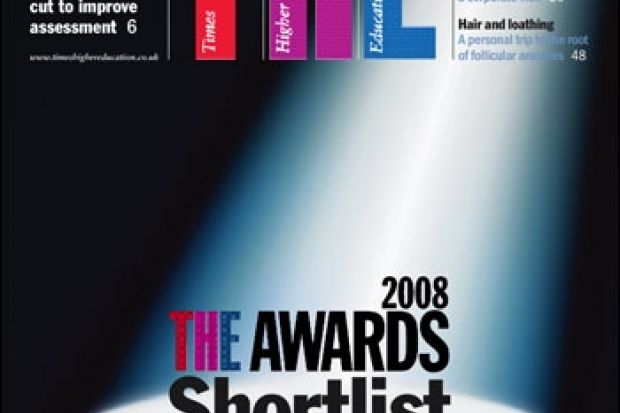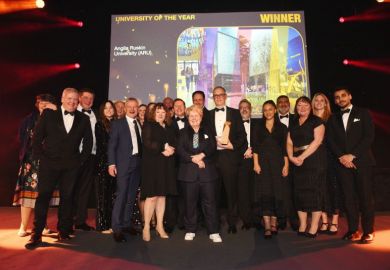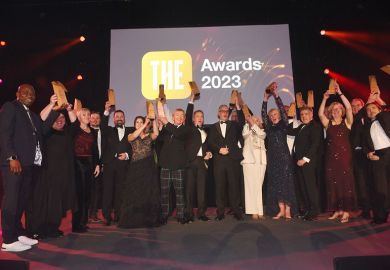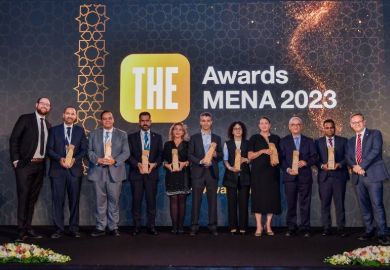It is four years since we launched the Times Higher Education Awards. Each year, the response has both surprised us and surpassed our expectations; this year is no exception.
For the 2008 Awards, more than 130 institutions have submitted an impressive 500-plus entries. As always, shortlisting has been a difficult task, but the entries in the 18 categories paint a picture of a higher education sector that is innovative, imaginative and inspirational.
The winners will be announced at the Awards evening at the Grosvenor House Hotel, Park Lane, London, on 23 October.
I would like to thank our sponsors and judges for their time and effort, but most of all I would like to thank all those who entered and congratulate the shortlisted candidates: what follows is a showcase of your achievements.
Ann Mroz
Editor
EXCELLENCE AND INNOVATION IN THE ARTS
Sponsored by the Arts Council
Artswork, Bath Spa's Centre for Excellence in Teaching and Learning in the creative industries, consists of six "learning labs" that stimulate teaching and learning in partnership with key industry professionals. The teaching is led by practitioners in each subject area - creative writing, English literature, creative music technology/commercial music, performing arts, interactive multimedia/design, and fashion and textiles. Last academic year, Bath Spa introduced the UK's first foundation degree in publishing. BroadcastLab brought in mentors from industry to guide students in making films, and DesignLab enrolled design agencies to give one-to-one guidance to students.
Newcastle University Medical School in collaboration with Durham University
Using a grant from the National Patient Safety Agency, Newcastle's Medical School commissioned a play and a related workshop from Operating Theatre, a medical performance troupe based at Newcastle University. The work, White Lies, formed the centrepiece of a half-day educational event for 100 Durham students. White Lies, which is based on real-life events, is set in a neonatal intensive-care unit where a "near-miss" error occurs; the play considers what happened in the preceding 24 hours. At the Durham performance, second-year undergraduates cross-examined the characters and took part in activities that developed the educational themes of the performance.
Queen's University Belfast
In April 2008, the Naughton Gallery at Queen's gave visitors a chance to "hear" the university's 300-piece silver collection, much of which has been kept in secure storage for many years and is largely inaccessible to visitors. The event - a partnership between the gallery, the Sonic Arts Research Centre, Queen's, Fallt (a media design collective) and silversmith Cara Murphy - was part of a wider effort to open up the university's collections. It brought together academics from two universities, ten sound artists and new technology to present a semi-permanent display called Silver Sounds. Visitors are able to explore and interact with the silver and trigger especially composed "soundscapes". Among other collections that Queen's intends to bring out of the storerooms are medical apparatus, archaeological finds, musical instruments, and zoological, and anatomical and entomological specimens.
In 2007, Aberdeen's Cultural Engagement Strategy Group (CESG) established a grant scheme to support innovation in the arts and to promote the city of Aberdeen as a centre of cultural excellence. The Director's Cut was a series of events celebrating the art of film-making in which film-makers Nicolas Roeg, John Akomfrah, Allan Shiach, Sir David Attenborough and Raul Ruiz participated. Meanwhile, WORD Festival, an annual literary event organised by the university, this year celebrated record audience figures of 11,000. The cultural drive chalked up another success in March when CESG head Chris Gane was appointed the university's first vice-principal for culture and communities.
University College Plymouth St Mark & St John
Art: A Resource for Reconciliation over the World (Arrow) is an initiative that seeks to develop the creative arts as a resource for peacebuilding. It has also inspired the creation of a new MA programme on the creative transformation of conflict through the arts. Arrow has established youth arts groups in the UK and abroad and organised theatre summer schools for young people in Plymouth, Burnley, South Africa and the West Bank. The new Desmond Tutu Centre on the UCP's Marjon campus will serve as a global focus for developing the arts as a resource for reconciliation. In the past year, Arrow has produced a one-man show that toured the UK and also went on to visit Freetown, Sierra Leone, and Bethlehem as part of the celebrations marking the repeal of the Slave Trade Act.
Plymouth's Fragmented Orchestra is an installation of tiny microphones, or "neurons", at 24 diverse public locations across the UK, ranging from football stadiums, motorway crash barriers, school playgrounds and an offshore buoy with a ringing bell. The sounds picked up by the neurons are fed in to Liverpool's FACT gallery, where 24 speakers allow visitors to listen to the sounds from each site and hear how they interact; a map in the gallery details the location of all the neurons. The collective sound that is generated in Liverpool is streamed back to each of the remote units. The interaction of the neurons is meant to mirror the function of the human brain. The project is an interdisciplinary collaboration between Jane Grant, an artist, John Matthias, a composer, musician and physicist, and Nick Ryan, a composer and sound designer.
WIDENING PARTICIPATION INITIATIVE OF THE YEAR
Supported by Hefce
Birkbeck, University of London
The Preparation for higher education course, which gives participants 60 credits towards their Level 4 certificate of higher education introductory studies, is a collaboration between Birkbeck's faculty of lifelong learning and two Sure Start children's nurseries in East London. It is part of a Birkbeck, Stratford project that aims to extend the availability of part-time higher education to people from diverse and underrepresented communities in the local area. Students are helped to continue their studies towards degrees in early-childhood studies at the University of East London or Birkbeck's BSc in social sciences, both of which are available in Stratford. The project has attracted the interest of other Sure Start centres in East London, and there are plans to extend similar provision to other areas.
The Keelelink programme was developed to help Keele formalise widening-participation partnerships with local schools and colleges and to streamline provision for young people, parents, teachers and the local community. Participating schools can access free services and activities in the Keelelink brand such as homework clubs and e-mentoring. There are plans to extend the project to as many schools and colleges as possible within 60 miles of the university. The scheme now has 123 member schools and colleges, 77 of which facilitate post-16 study.
London College of Fashion, University of the Arts
One of the most unusual among last year's events to mark the bicentenary of the abolition of the Slave Trade Act was Enslaved, a fashion show at Tate Britain on the theme of liberty and revolution. The show was created by 60 young people, aged 16-18, from inner-city London. Most of them were from black and ethnic minority groups, and they felt that slavery was part of their personal heritage. The group worked on the project at the London College of Fashion, where staff also helped them. For the show itself, half the group refashioned donated second-hand cotton clothes while the other half concentrated on hair and make-up. The university and Tate Britain have maintained a strong relationship with the participants. Eight joined the university soon after the show, and others joined at the start of this academic year.
St George's, University of London
The Adjusted Criteria programme at St George's widens participation in medical degrees by assessing applicants' academic qualifications through comparison with their social peers rather than with the national average. St George's is able to alter the requirement that those who are invited for interview must have an average of grade A in GCSEs and all As at A level. Applicants with an A-level performance 60 per cent above the average for their school are guaranteed an interview at which their educational background is not disclosed. Since the programme began in 2002, it has accounted for almost 7 per cent of St George's medical students. All participants come from comprehensive schools, and many are from backgrounds with no tradition of higher education.
Sunderland's Choices Together programme seeks to raise the educational aspirations of Year 10 and Year 11 pupils in care - only 1 per cent of children in care go on to higher education. Choices Together, which involves three days of information and confidence-building activities, is run by Sunderland in partnership with the universities of Newcastle and Northumbria. Topics covered include routes into higher education, subject options, taster sessions, the university application process, student finance, personal motivation, confidence-building, team-building and goal-setting. Mentoring support is provided by current undergraduates. Participants are also invited to attend other university events with guests.
University Campus Suffolk
Last academic year, the universities of East Anglia and Essex opened the popular University Campus Suffolk (UCS) to address the low participation rates in Suffolk and the sub-region. The UCS, which is designed to deliver access to higher education locally, includes a central campus in Ipswich, five centres across the county and into Norfolk, and a series of local learning centres - Learning Enterprise Access Points, or LEAPs - in smaller market towns. Academic planning involves local authorities and other local agencies. Widening participation is central to the mission of the UCS. Only 12 per cent of full-time students funded by the Higher Education Funding Council for England have parents with managerial and professional occupational backgrounds. Student bursaries are generous, and support is on hand from the UCS Learning Development Centre and the online virtual learning environment portal, which includes a special portal for new applicants.
RESEARCH PROJECT OF THE YEAR
Sponsored by SAGE
London School of Economics
A multidisciplinary team dominated by young researchers has been "hunting" facts and trying to discover why some seem to lend themselves to misinterpretation or transmission as gossip or are easily embroidered as rumour while others manage to retain their integrity as they travel. Among areas examined by the researchers were how well scientific facts survive when they are disseminated in public, how economic "facts" are used in the political arena, and how health facts contribute to medical policy. The project concludes that to survive well, facts need "good companions" - labels, packages, vehicles and good associates - striking characteristics or "functional roles" in society. It also concluded that well-travelled facts have differing characteristics according to the academic discipline to which they relate. For example, anthropologists like particular facts while economists favour generic ones.
London South Bank University and Wimbledon School of Art
Tate Encounters is an interdisciplinary collaboration between Tate Britain, the LSBU and Wimbledon that uses ethnographic participant action to help the museum sector understand how to make their collections and programmes more relevant to diverse local and global audiences. The scheme also informs programming events and exhibitions at Tate Britain. The project provides opportunities for LSBU undergraduates from a wide variety of migrant family backgrounds, many of whom have no other involvement in the arts, to become co-researchers. Tate Encounters, which questions existing ways of categorising of audiences and visitors, proposes that cultural-diversity policies can be developed via more nuanced accounts of cultural difference. During the last academic year, Tate Encounters produced three issues of an online journal containing research working papers, editorial comment, material from ethnographic filmmaking, and image/text essays and narratives.
Queen Mary, University of London
At the turn of the millennium, professor of computer science Peter O'Hearn of Queen Mary, working with John Reynolds of Carnegie Mellon University, invented Separation Logic, a theory that addresses the problem of how computer memory stores and updates information. Now, a team led by O'Hearn (with Cristiano Calcagno, of Imperial College London, and Dino Distefano and Hongseok Yang, of Queen Mary) has developed a practical application of the theory, a software tool called Space Invader that makes computers more reliable by identifying and even eliminating a frequent source of errors that are caused by misuse of computer memory. In late 2007, Space Invader reached a milestone, eliminating certain errors from systems programs of up to 10,000 lines of code. Teams at the universities of Princeton, Yale, Berkeley, Sydney and elsewhere are now building tools based on Separation Logic and Space Invader, as is the computing giant Microsoft.
A Leicester study, Fish and Chips, collected sticklebacks to analyse the microscopic wear patterns that formed on their teeth as they fed. Bearing in mind the saying that you are what you eat when it comes to speciation and evolutionary change over millions of years, researchers wanted to use living animals to interpret dietary preferences and feeding ecology of 10-million-year-old fossil fishes and examine whether changes in feeding affected the evolution of the fish. The methodology overcame a fundamental problem in the study of speciation - that field and laboratory experiments take place over limited, human timescales yet species originate over millions of years. The results allowed the researchers to see that evolutionary changes in these characteristics were closely linked to how sticklebacks feed. The experiment represented the first time that the relationship between feeding habits and evolution has been directly testable using fossils.
Strathclyde's Institute for Medical Devices has pioneered a sensor half the size of a postage stamp to check conditions under a medical dressing without having to remove it. Wounds heal quickest in a warm environment, and the sensor can tell medical staff whether a wound is too dry, too wet or just right to heal properly. Removing dressings unnecessarily can discomfort patients, impede healing and be costly in staff time and new dressings. The sensor, which has proved effective in clinical tests, can be applied in a wide range of dressings used to treat chronic and acute wounds, including burns, surgical wounds and sores. It is estimated that chronic leg ulcers affect ten in every 1,000 adults in the West at some time in their lives.
Many people think of climate change as a gradual process that occurs over decades and centuries, but environment experts believe that the Earth's climate system can cross tipping points at which a small change can have a big and sudden impact on the fate of large areas. A research team at East Anglia has identified a shortlist of nine potential climate-system tipping elements so that scientists can monitor them with early-warning systems and help policymakers and the public avoid dangerous thresholds. The East Anglia team also identified the additional research that is required to make such early-warning systems work in practice. The findings are already beginning to influence strategies for climate-change mitigation and adaptation. According to the researchers, the findings also provide an argument for altering the European Union's targets on tackling global warming. They also reveal where in the world the capacity for adaptation to uncertain tipping points needs increasing. Several organisations have responded by making tipping points a focus for their research and meetings. The Proceedings of the National Academy of Sciences is preparing a special issue that will examine tipping points, and the Natural Environment Research Council has included them in its new research strategy.
Register to continue
Why register?
- Registration is free and only takes a moment
- Once registered, you can read 3 articles a month
- Sign up for our newsletter
Subscribe
Or subscribe for unlimited access to:
- Unlimited access to news, views, insights & reviews
- Digital editions
- Digital access to THE’s university and college rankings analysis
Already registered or a current subscriber? Login




